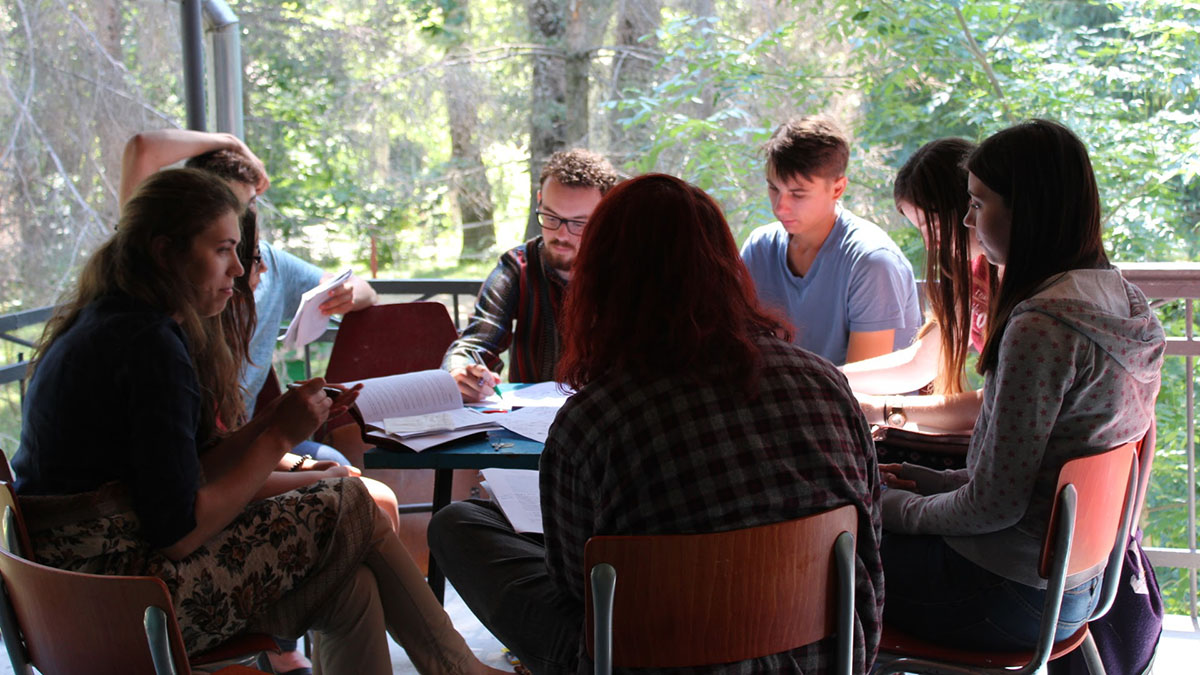Region / Country: Eurasia
Belarus
Georgia
Kazakhstan
Eurasia
Exploring Mark’s gospel in three languages
Tuesdays evenings are one of the highlights of the week for many international students in one Eurasian country. 15-20 of them gather to eat together and look at the account of Jesus’ life in Mark’s gospel. Around the room there are students from all over the world. They are a mixture of atheists, Muslims and Christians. Many are from unreached countries. There’s an amazing buzz around the room as students look at the Bible together in English, Japanese and Russian. Because of the different languages spoken, the students first act out the passage, before discussing it in small groups.
There are no manuals for the leaders to follow. They try things, make mistakes and learn from them. Sometimes it’s a bit chaotic – but God keeps bringing the students back! They are hungry to learn. After reading Mark’s gospel, one student from China said, “But how did it all start? What happened before Jesus? I want to learn about what happened in the beginning!”
- Thank God for the way He has opened up opportunities for students from unreached countries to meet Christians during their time as international students.
- Pray that these students would come to know Jesus for themselves as they continue to look at Mark’s gospel this year.
- Pray for the leaders to know how to effectively communicate the gospel with these international students, despite the language and cultural barriers.
Thanks for praying with us!
The question of the universe
I lived like a prince — a wealthy Muslim family, in a wealthy Islamic country. Everything was done for me; I didn’t even know how to tie my shoelaces until recently. My parents, being devout Muslims, taught me the Islamic way of life from the very beginning. I would sing the call to prayer in the mosque every day and once even went on pilgrimage to Mecca.
But from the age of 12, I started to have doubts. There were things about the Quran that just didn’t sit comfortably with me — the history, the science, the teaching. At the age of 16 I made the decision to leave Islam. I was too tired of religion. I felt betrayed; I felt that I’d been living a lie. So I closed my eyes to all religion.

Here by chance?
That’s how I stayed until January 2018. I had felt very sure of my atheism, but then I started to wonder again. No matter how much I studied, no one could explain how the universe came to be. Believing the universe came from nothing also required faith. Many times I would see beautiful things — the majestic mountains or amazing pictures of the cosmos captured by the Hubble telescope. How could it all be here by chance? It just seemed impossible. I had to acknowledge that there must be a God.
Clicking into place
Eventually, I started reading about Christianity. And I really loved it. But I knew I’d need to be more sure of it before making any decisions. A few months ago, I moved to a country in Eurasia to study. I would often find myself praying to the God of the Bible, asking for help, because I really wanted to know the truth. One day I met a Christian, and when he invited me to go along to his Bible study group, I happily agreed.

A week later, I went along to the meeting and I loved it. I found myself craving to learn more about the Bible and the Christian faith, and in my heart I felt that this is the right path. It all clicked so well in my mind. I came to understand that God loves me so much that He sent His Son Jesus! Jesus came to earth specifically to die for my sins (and the sins of the whole world) so that I could be forgiven. Ephesians 2:8–10 declares that salvation is a gift of God — not something earned. It is received only by faith — simply trusting completely in the death, burial and resurrection of Christ as payment for my sin.
New life with Christ
Since beginning my life with Christ, He has continued to change me through His word, by the power of the Holy Spirit who lives in my heart. He is working in my life. I now really care for other people — not just only for myself. There is a wonderful sense of relief in knowing that I am forgiven and secure, in knowing that God is on my side and wants the best for me. I’d never felt this way before. I love this Christian religion!
When Akif met Jesus
Akif* was 15 years old. He was far too old to be reading children’s picture books. But there was something about this one that he found strangely compelling. It was a Bible. His parents would confiscate it if they found it, so he read it in secret. It didn’t make any sense to him. But he couldn’t get it out of his mind.
Gate-crashing
Not long after that, one of his Muslim friends invited him to go to an event to find out about the prophets. As soon as they walked through the door, they knew there had been some terrible misunderstanding. They had thought they were going to a mosque, to attend an event organised by Muslims. But this wasn’t a mosque — it was an apartment. And these people weren’t Muslims — they were Christians! Akif was horrified. How had this happened?! He had never met a Christian before, and here was a whole room full of them! What would they do to him? Would they kill him?
The two teenagers stumbled their way through the meeting, utterly bewildered and unsure of what to do. The offering basket was passed around, and Akif’s friend, thinking perhaps they were bribing him to become a Christian, took money out of the basket for himself. Worse was to come: they somehow got caught up in the altar call. This was a nightmare! “God, forgive me”, Akif desperately prayed. “They’re making me a Christian!”
People in the room came up to congratulate them. Amid all the confusion, Akif was invited to an Alpha course, to explore the basics of the Christian faith. Quite why he accepted the invitation, he doesn’t know to this day. There was just something about these people that attracted him. A warmth of welcome, a sense of safety he’d never experienced before.

He will not be silenced
At some point along the 12-week alpha course, Akif genuinely did become a Christian, and the transformation was unmistakable. No-one told him to do evangelism. But the grace of God was such incredible news — how could he possibly keep it to himself? Before long, all his friends and teachers knew, and they were not happy about it. Again and again they warned him to stop. But he just couldn’t.
Around that time, an Islamic extremist group started to grow in that city. Young members of the group beat him up and threatened to kill him. They told everyone he was a blasphemer. His friends refused to shake hands with him. After one year, his family found out, and their reaction was even harder to bear. His mother threatened to kill him, but when she found out that he was willing to die rather than deny Christ, she threatened to kill herself instead. His father broke down, begging him not to bring such shame on the family. Every week his relatives would come and try to convince him to give it up.

Growing in Christ
For two years, the persecution raged.
At the age of 17, Akif went to university, and to his surprise the persecution stopped as suddenly as it had begun. For the next four years, God had different spiritual lessons for Akif to learn. He was amazed to find fellow believers among the other students. He joined the IFES fellowship and learned about discipleship and accountability. It was a season of comfort, peace and personal growth.
Akif is now working for the national movement, and he’s still passionate to see others come to know Jesus. A couple of years ago, Akif felt God call him and his family to move to a new city within the country. That city had no church, no Christian students, and perhaps only four or five local believers. He now runs a business in the city and through it has found many opportunities to meet some of the university’s 5000 students. 15–20 of them have been coming along to study the Bible. Several are seeking. But for students who choose to become Christians, life in this country is not going to be easy. It could mean death, and it would almost certainly mean persecution and opposition.
Big prayers
As if the work isn’t hard enough already, the movement are keen to consider how they can pioneer work in a neighbouring country that is even more closed to the gospel. Though humanly speaking this is impossible, please pray for them to keep praying big prayers. Pray that there would be many more stories as remarkable as Akif’s. And pray that God would open doors to establish student ministry in both of these closed countries.
*name changed
After the iron curtain came down
Georgia 1996.
It was a cold night. Werner had learned that there was a student who was stuck in a village and couldn’t afford the bus ticket to get back to the city. He and one other student set out on the perilous three-hour journey through the snow to fetch her.
It was a dangerous decision. Georgia in the 1990s was not a safe place to be. Three foreigners would be beaten up and robbed in an average week. The man who lived on the floor above was shot dead on the staircase. Werner and his young family walked past the bullet holes on the wall every day. For those like him, pioneering student work, just surviving seemed unlikely.

A narrow escape
They reached the student in the village and started the journey home. As they were driving back they saw three armed men in front of them, indicating that they must stop the car. Was this the end? The students in the back were shouting at him not to stop. What was he to do? He slowed down the car and turned off the lights, as if about to stop. But before the men could open the doors, Werner put his foot down and they sped off into the night, as fast as they could go. It was terrifying.
When they finally arrived back in the city, they told their friends what had happened. One of them, a pastor, turned to Werner:
“Well done. Now they know that you really love them.”
Werner never had to motivate the students to make sacrifices for Jesus after that experience. Any student turning to Christ in those days understood about the costs involved.
Ready to sacrifice everything
The stories of courageous students abound. One was beaten up by a street gang because he was a Christian. Another student was threatened with a knife at her throat because she was sharing her faith. Another risked walking through a cemetery at night to reach a student dormitory and start an evangelistic Bible study group. She often spoke of the need to be ready to sacrifice everything for Jesus. She was one of the girls from the car. She went on to become the student movement’s first general secretary.
The remarkable transformation
It would have been hard for those Christian students to imagine how different life would be in Georgia today, just twenty years later. The transformation has been remarkable. The country is still predominantly Orthodox, but there is freedom of religion. Today there are active student groups in three cities and pioneering work in a fourth. There is also work among high school students and graduates. In the last two years there have been two fruitful university mission weeks and a performance of the Mark Drama to which 200 people came. Over 30 students made professions of faith in 2017.
Though there remains a lot of work to be done, there is certainly much to celebrate.

Eurasia today
There are still several countries in Eurasia which are as seemingly impenetrable as Georgia was 20 years ago. Gaining access to those countries might not be possible, but there have been some incredible opportunities in recent years to reach those students. Universities in some of the most closed nations in Eurasia are now sending their students to neighbouring countries for a year or more to study. In this way, many have had the chance to meet believers and hear the gospel.
Praying for change
Last year one of those international students became a Christian. As he finished his studies and moved home, he resolved to try to meet up with the students who had become Christians and returned home a year before him. He hoped they would be able to encourage each other to keep going in their faith. For security reasons, contact with this international student had to stop when he went home. No-one knows how he is doing or whether he managed to meet up with the other Christian students. No-one knows if he’s been able to share the hope of the gospel with his family and friends. Please pray for him.

With Islam, Orthodoxy and nationalism on the rise across the region, it’s easy to lose heart. Werner now leads IFES pioneering in Eurasia. We asked him if he thought the situation would ever change. “Yes”, he said. “It will change. But there might be some great costs to pay.”
Pray on with us for transformation to come to these dark corners of the world. Pray boldly that God would raise up more risk-taking students there with a burden to share the gospel, whatever the cost.
Standing for Jesus in the workplace
Dima is a 23-year-old graduate from Ukraine. He’s passionate about politics and wants to use his career to witness to others about Jesus.
But starting out in politics is not easy: corruption is common and he doesn’t always know what to say or how to act. There is only one other believer in the Ukrainian parliament, so Dima has very little support.
He’s not the only recent graduate in this situation. His story is repeated by thousands of others starting out in the world of work. They are gifted, fresh and keen to work for God’s glory, but they lack the support they need to navigate the challenges of the workplace.
That’s why IFES Graduate Impact exists.
Staying salty in the workplace
Graduate Impact supports young Christian adults across Europe and Eurasia as they transition from university to work. Its purpose is to help them mature into more effective ambassadors for Christ in their workplaces, professions and societies.
It operates through a network of mentoring groups, called Cross-Current. Some groups focus on particular professions (law, economics, politics, business and management, sciences), whilst others cover specific locations (Belfast, Helsinki, Novosibirsk, Kiev, Tirana, Bucharest, Chisinau, Cluj and Flanders). Graduates join a group for three years and are taught to apply biblical wisdom to the issues they face in their working lives. They also get the opportunity to meet older believers in their profession.

Grappling with big questions
Dima first heard about Graduate Impact through his one believing colleague in parliament. That friend had previously attended a Cross-Current politics group and encouraged Dima to go along. Dima later shared:
“This was my first time abroad and I met great people who inspired me to continue my journey. I met like-minded people from different parts of the world and we spent a blessed time together. Cross-Current Politics is a great support to me in my calling!”
Graduate Impact also helped two young lawyers from Eastern Europe. They work in a place where every transaction is expected to be accompanied by a ‘facilitation fee’. Through the Cross-Current law group they’ve been encouraged to find new ways of practising law without bribes.
Other graduates struggle to know how to be distinctive in a secular workplace. What should I say when my colleagues criticise my boss? How can I work hard without my job becoming an idol? How is my faith relevant to my working life?
Over the last ten years, Graduate Impact has helped over 300 young people like Dima to grapple with these big questions and make an impact as Christians in the workplace.
Get involved:
- Graduates in Europe and Eurasia can find out more and join a group at: www.graduateimpact.org
- In another region? Think about starting a group with fellow graduates in the workplace to support one another. Talk to your national movement or email admin@graduateimpact.org for advice and support.
- Give to support this ministry





